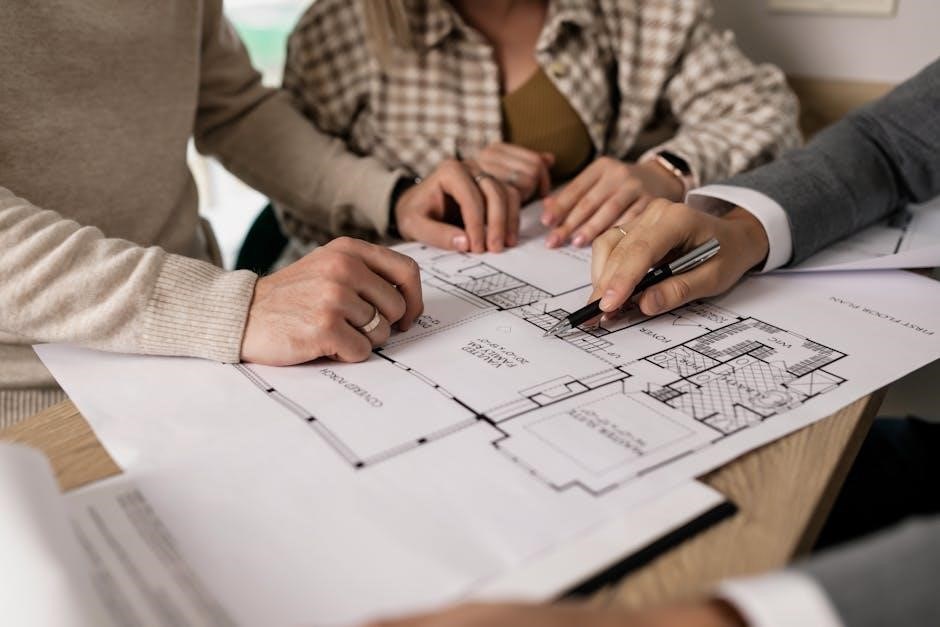Overview of Property Management Duties and Responsibilities
Property management involves diverse duties, including maintaining properties, ensuring tenant safety, and handling legal compliance. It requires balancing tenant needs with landlord interests to ensure smooth operations.
1.1. Definition and Scope of Property Management
Property management involves overseeing rental properties, ensuring tenant relations, maintenance, and legal compliance. It encompasses tasks like rent collection, inspections, and enforcing lease agreements, balancing tenant needs with landlord interests to maintain profitable and harmonious property operations.
1.2. Key Roles of a Property Manager
A property manager’s key roles include tenant screening, lease preparation, and rent collection. They handle maintenance, inspections, and tenant complaints while ensuring legal compliance. Effective communication and conflict resolution are essential to maintain positive tenant-landlord relationships and ensure profitable property operations.

Tenant Management and Relations
Tenant management involves screening, lease preparation, and addressing complaints. Building positive relationships ensures tenant satisfaction and compliance with property rules, fostering a harmonious living environment.
2.1. Tenant Screening and Selection Process
Tenant screening involves verifying applicants’ backgrounds, credit history, and employment status. A thorough process ensures selecting reliable tenants, minimizing potential issues, and maintaining property value while complying with fair housing laws to avoid discrimination and ensure equal opportunity for all applicants.
2.2. Lease Agreement Preparation and Enforcement
Property managers draft and review lease agreements, ensuring compliance with local laws. They enforce terms, address violations, and maintain communication to resolve disputes, protecting both tenant rights and landlord interests while ensuring contractual obligations are met throughout the tenancy period.
2.3. Handling Tenant Complaints and Disputes
Property managers act as mediators, addressing tenant complaints promptly and fairly. They investigate issues, negotiate resolutions, and ensure compliance with legal standards. Effective communication and documentation are key to resolving disputes amicably, maintaining tenant satisfaction, and protecting the landlord’s interests while fostering a positive rental environment.
Property Maintenance and Repairs
Property managers oversee routine inspections, schedule repairs, and ensure compliance with safety standards; Their role is crucial for maintaining property value and ensuring tenant safety and satisfaction.
3.1. Regular Property Inspections
Regular property inspections are essential for identifying maintenance issues early. Managers conduct routine checks to assess property condition, ensuring compliance with safety standards and preventing potential hazards. These inspections also help in maintaining the overall value and functionality of the property, benefiting both tenants and owners.
3.2. Scheduling and Overseeing Maintenance Work
Scheduling and overseeing maintenance ensures properties remain safe and functional. Managers coordinate repairs, hire contractors, and monitor progress to ensure timely completion. They also prioritize urgent issues and adhere to budgets, ensuring all work meets quality standards and complies with safety regulations.
3.3. Ensuring Compliance with Safety Standards
Property managers must ensure properties meet all safety regulations. This includes conducting regular inspections, addressing hazards, and enforcing compliance with local codes. They also maintain records and ensure corrective actions are taken promptly to safeguard tenants and avoid legal issues.

Financial Management Responsibilities
Property managers oversee financial tasks such as rent collection, budgeting, and expense tracking. They ensure accurate accounting and prepare financial reports for property owners, maintaining transparency and accountability in all transactions.
4.1. Rent Collection and Accounting
Rent collection and accounting are primary duties of a property manager. Ensuring timely payments, maintaining accurate financial records, and using accounting software are essential. This role also involves preparing invoices, tracking expenses, and ensuring compliance with financial regulations to maintain transparency and accountability for property owners.
4.2. Budgeting and Expense Management
Budgeting and expense management involve creating detailed financial plans to ensure property profitability. This includes forecasting income, controlling operational costs, and allocating funds for maintenance. Effective management ensures resources are used efficiently, preventing overspending and maintaining financial stability for property owners.
4.3. Financial Reporting to Property Owners
Financial reporting involves providing property owners with detailed income statements, expense breakdowns, and profit analyses. Regular updates ensure transparency, enabling owners to track property performance and make informed decisions. Accurate records and compliance with accounting standards are essential for maintaining trust and ensuring financial accountability.
Legal and Regulatory Compliance
Legal and regulatory compliance involves adhering to landlord-tenant laws, ensuring tenant protections, and following proper eviction procedures. Property managers must stay updated on legal requirements to avoid liabilities and ensure fair practices.
5.1. Understanding Landlord-Tenant Laws
Understanding landlord-tenant laws is crucial for property managers to ensure compliance and protect tenant rights. These laws cover eviction processes, lease agreements, and tenant protections, preventing harassment and discrimination. Managers must stay informed to navigate legal obligations effectively and maintain fair tenant relationships, avoiding potential legal disputes and ensuring a safe living environment for tenants.
5.2. Ensuring Compliance with Housing Codes
Property managers must ensure properties meet local housing codes, addressing safety, health, and structural standards. Regular inspections and prompt repairs are essential to avoid violations. Compliance protects tenants from hazardous conditions and prevents legal penalties, ensuring a safe and habitable living environment while maintaining the property’s value and marketability over time.
5.3. Handling Evictions and Legal Proceedings
Property managers must navigate evictions and legal disputes, ensuring compliance with landlord-tenant laws. This includes documenting breaches of lease agreements, filing eviction notices, and representing landlords in court. Balancing legal requirements with tenant rights is crucial to avoid unlawful detainer claims and ensure fair, lawful resolutions that protect both parties’ interests effectively.
Marketing and Advertising Properties
Property managers create attractive listings, use digital platforms, and organize viewings to showcase properties. Effective marketing strategies attract potential tenants and maximize rental opportunities efficiently.
6.1. Creating Effective Property Listings
Property managers craft engaging, detailed listings with high-quality images, highlighting amenities and features. Accurate descriptions attract targeted tenants, ensuring properties are showcased in their best light to maximize interest and inquiries effectively online.
6.2. Utilizing Digital Marketing Channels
Property managers leverage social media, property portals, and email campaigns to promote listings. Digital marketing enhances visibility, attracts potential tenants, and streamlines communication. Effective online strategies ensure properties reach a broader audience, maximizing rental opportunities and maintaining competitive market presence efficiently.
6.3. Organizing Open Houses and Viewings
Property managers coordinate open houses and viewings, ensuring properties are presentable and accessible. They schedule appointments, prepare marketing materials, and oversee visitor access. Effective organization enhances tenant attraction, fostering positive first impressions and efficient rental processes while maintaining property security and tenant privacy throughout the viewing experience.

Risk Management and Insurance
Property managers assess risks, secure liability insurance, and ensure property insurance covers losses. They also conduct safety inspections to mitigate potential hazards and protect investments from unforeseen events.
7.1. Assessing Potential Risks
Property managers evaluate risks like tenant disputes, structural issues, and liability claims. They identify vulnerabilities, monitor safety standards, and implement preventive measures to safeguard properties and minimize financial losses. Regular inspections and tenant screenings are key strategies to mitigate these risks effectively and ensure compliance with legal requirements.
7.2. Securing Adequate Insurance Coverage
Property managers must ensure properties are insured against risks like accidents, natural disasters, and liability claims. They secure coverage for general liability, property damage, and tenant-related incidents. Adequate insurance protects owners from financial losses and legal disputes, ensuring long-term asset protection and compliance with regulatory requirements.
7.3. Implementing Safety Measures
Property managers must implement safety measures to prevent accidents and ensure compliance with regulations. This includes installing security systems, conducting regular fire drills, and maintaining emergency exits. They also ensure proper lighting and address potential hazards to create a safe environment for tenants and visitors, reducing liability risks for property owners.

Communication and Stakeholder Relations
Effective communication is vital for maintaining positive relationships with tenants, property owners, and vendors. Regular updates and clear dialogue ensure alignment and address concerns promptly and professionally.
8.1. Maintaining Clear Communication with Tenants
Property managers must ensure consistent and transparent communication with tenants through various channels like emails, calls, or portals. Regular updates on maintenance, rent, and policies foster trust and address concerns promptly, ensuring a harmonious landlord-tenant relationship and resolving issues before they escalate into disputes or legal matters.
8.2. Liaising with Property Owners
Property managers act as intermediaries between tenants and owners, ensuring clear communication and alignment of interests. They provide regular updates on property performance, financials, and maintenance needs, while addressing owner concerns to maximize profitability and ensure compliance with legal and contractual obligations.
8.3. Building Relationships with Contractors and Vendors
Property managers foster strong relationships with contractors and vendors to ensure timely, cost-effective maintenance and repairs. They negotiate favorable terms, schedule services, and monitor performance to maintain property conditions and satisfaction, ensuring reliable support for tenant needs and property upkeep.
Record Keeping and Documentation
Property managers maintain detailed records of tenant agreements, property conditions, and financial transactions. Accurate documentation ensures compliance with legal requirements and provides a clear audit trail for all activities.
9.1. Maintaining Tenant Records
Maintaining tenant records involves securely storing rental agreements, payment histories, and communication logs. Property managers must ensure accuracy and confidentiality to protect tenant privacy and comply with legal standards, while also providing easy access for reference or disputes.
9.2. Documenting Property Conditions
Documenting property conditions involves detailed records of inspections, damages, and repairs. This includes photos, videos, and written reports. Accurate documentation ensures transparency, prevents disputes, and provides evidence for legal compliance, while also maintaining accountability for maintenance and tenant responsibilities throughout the tenancy period.
9.3. Keeping Track of Financial Transactions
Accurate tracking of financial transactions is crucial for transparency and accountability. This includes recording rent payments, expenses, and budget adherence. Property managers use specialized software to maintain detailed records, ensuring compliance with accounting standards and providing clear financial reports to property owners, which aids in informed decision-making and tax compliance.
Ethical Considerations in Property Management
Ethical practices are vital in property management, ensuring fair treatment of tenants, transparency in dealings, and adherence to professional standards to build trust and maintain integrity in operations.
10.1. Avoiding Discrimination in Tenant Screening
Property managers must adhere to fair housing laws, avoiding discrimination based on race, gender, age, or disability. Ensuring equal opportunities and transparent screening processes fosters ethical tenant relations and legal compliance, protecting both tenants and property owners from potential disputes and liabilities.
10.2. Ensuring Transparency in Dealings
Transparency builds trust between property managers, tenants, and owners. Clear communication about policies, fees, and decisions ensures accountability and fairness. Documenting all interactions and maintaining open channels for questions or concerns fosters a positive and ethical business environment, reducing misunderstandings and potential conflicts.
10.3. Adhering to Professional Standards
Adhering to professional standards ensures ethical practices in property management. This includes following industry codes of conduct, staying updated on legal requirements, and committing to continuous professional development. Upholding these standards enhances credibility and maintains trust with tenants, owners, and regulatory bodies, promoting a reputation for reliability and integrity in all dealings.

Current Trends in Property Management
Current trends include the integration of technology, a focus on sustainability, and adapting to evolving tenant expectations for better living experiences and efficient management solutions.
11.1. Impact of Technology on Property Management
Technology is transforming property management through AI, automation, and digital platforms. Tools like property management software streamline tasks, enhance tenant communication, and improve decision-making. Online portals enable rent payments and maintenance requests, while data analytics optimize operational efficiency. Smart home devices and IoT further enhance security and maintenance, ensuring a modern, tech-driven approach to property care.
11.2. Growing Importance of Sustainable Practices
Sustainable practices are becoming essential in property management, focusing on energy efficiency, waste reduction, and water conservation. Property managers are adopting green technologies and renewable energy solutions to reduce environmental impact. Tenants increasingly value eco-friendly properties, driving demand for certifications like LEED. Sustainability not only benefits the environment but also enhances property value and attracts responsible tenants.
11.3. Evolving Tenant Expectations
Tenants increasingly expect sustainable living, smart home technologies, and responsive communication. They value transparency in dealings and prioritize properties with eco-friendly features. Modern tenants also seek a better quality of life, including amenities and maintenance responsiveness, driving property managers to adapt and innovate to meet these rising demands and expectations effectively.

Best Practices for Effective Property Management
Adopting a proactive maintenance approach, fostering positive tenant relationships, and pursuing continuous professional development are key strategies for effective property management and long-term success.
12.1. Proactive Approach to Property Maintenance
A proactive approach involves regular inspections, addressing issues before they escalate, and scheduling preventive maintenance. This minimizes repair costs, ensures tenant safety, and maintains property value, fostering a positive living environment and tenant satisfaction.
12.2. Building Positive Tenant Relationships
Building positive tenant relationships involves clear communication, timely issue resolution, and fostering trust. This leads to higher tenant satisfaction, longer leases, and reduced turnover, creating a mutually beneficial partnership between tenants and property managers.
12.3. Continuous Professional Development
Continuous professional development is crucial for property managers to stay updated on industry trends, legal changes, and best practices. It involves ongoing education, certifications, and networking to enhance skills, ensuring effective property management and adapting to evolving challenges in the real estate market.


0 Comments